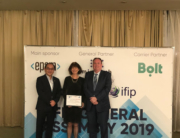 The first line of England’s National Curriculum for Computing states that the purpose of study is to “equip pupils to use computational thinking and creativity to understand and change the world”.
The first line of England’s National Curriculum for Computing states that the purpose of study is to “equip pupils to use computational thinking and creativity to understand and change the world”.
In support of this, Lawrence Williams of IFIP Technical Committee 3.4 (Professional and Virtual Education in ICT) has been working on a practical classroom project in London, Literacy from Python, which is starting to prove successful at secondary school level (pupils aged 11 to 14). The Literacy from Python project has already garnered some international interest, having been presented at IFIP Finland 2021, at the ICET 2022 64th World Assembly in Bath, and at WCCE Hiroshima 2022, and is starting to be adopted in secondary schools.
The method is to create short stories in Python, while simultaneously developing Python elements, such as turtle graphics, within these stories. There are additional benefits to teaching coding. Simon Peyton-Jones, Computing at School, says that students have skills to practically apply their imagination which can be “energising and motivational”, as evidenced by this unaided example below by 10-year-old Beth Mead.

The next challenge is to see if Literacy from Python can be developed at an earlier stage of classroom practice, namely in English Primary schools (ages 5 to 11). All of the coding work on the Literacy from Python web site, which has been designed to support teachers with detailed classroom materials, was carried out by a young Year 6 pupil, so it is reasonable to assume that other pupils of the same age might achieve similar results.
The next stage in the development of this project is the inclusion of the teaching method in a forthcoming Routledge teacher training book: Teaching and Learning with ICT in the Primary School, the 3rd edition of which is due for publication in late 2023. In the chapter, “Computer Programming in the Primary School”, Lawrence and young Beth explain how to develop computing concepts through story-telling, as well as practical work in Scratch, and explore the creative use of Python.
To find out more about the project and explore opportunities to introduce it in primary schools in England or internationally, please contact Lawrence Williams





